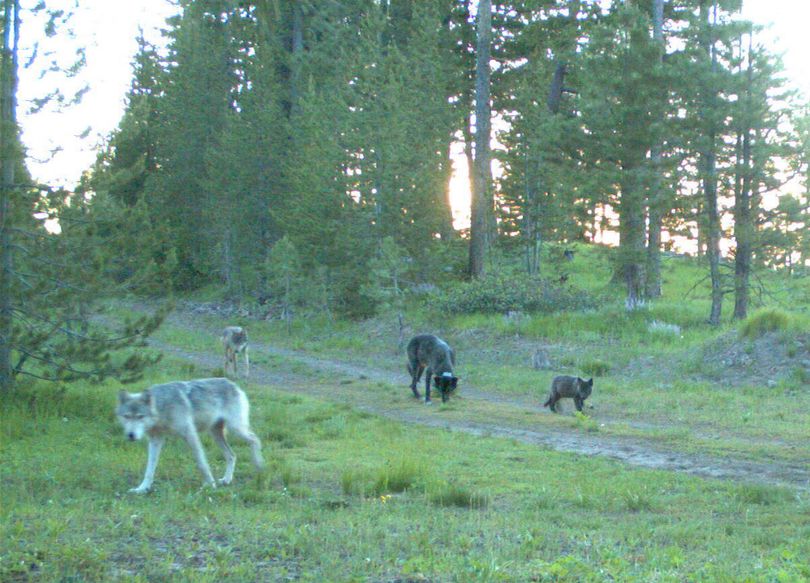Conservation groups urge feds to keep wolves protected in Pacific NW

ENDANGERED SPECIES -- Contacts for 24 conservation organizations say they sent a letter to President Barack Obama today asking for continued Endangered Species Act protection for wolves in the Pacific Northwest.
Although federal protection on gray wolves in most of Eastern Washington was lifted at the same time wolves were delisted in Idaho and Montana, wolves remain protected by state endangered species laws.
Wolves setting up housekeeping from the east flanks of the Cascades and into Western Washington would enjoy federal and state endangered species protection.
But groups, including Cascadia Wildlands, the Center for Biological Diversity, Conservation Northwest, Defenders of Wildlife, National Resource Defense Council, Oregon Wild, Sierra Club and others sent the letter, noting that the U.S. Fish and Wildlife Service is moving toward a decision on whether wolves in the Northwest and other areas will retain protection.
- Just for balance, I'm going to throw in a few observations to the points the groups make in a joint media release.
“Wolves are only just beginning to recover in the Pacific Northwest and need the continued protections of the Endangered Species Act,” said Noah Greenwald, endangered species director with the Center for Biological Diversity. “Wolves once roamed across most of the Pacific Northwest, but today they occupy just a fraction of their former range.”
- Wolves have just begun to work on game herds and kill livestock in Oregon and Washington.
About 100 wolves are dispersed among AT LEAST five Oregon packs and eight in Washington. All but two of these packs — the Lookout and Teanaway packs — lost federal protection along with the northern Rocky Mountains population, delisted by an act of Congress. The conservation groups are asking the administration to retain protection for these two packs and to develop a recovery plan for wolves in the Pacific Northwest, including in western Washington and Oregon and parts of California.
“Wolves called the Pacific Northwest home for 10,000 years,” said Jasmine Minbashian of Conservation Northwest. “The fact that they are returning to the Cascades on their own is a good sign, but if we want them to survive and fully recover they will need our help.”
- Efforts should start now to translocate wolves from Eastern Washington to the Mount St. Helens and Olympics areas to let Western Washington share the diversity/benefits/burden of having wolves. This would speed up recovery and expedite delisting of wolves in the region.
The need for continued protection of wolves in the Pacific Northwest was driven home when the Lookout Pack — the first breeding pack to be confirmed in Washington in more than 70 years — was decimated by poaching. The poachers were fortunately caught and prosecuted under the Endangered Species Act.
- In other words, the federal act has bigger penalties to offer as a deterrent to wolf poaching.
Since wolves were reintroduced to Yellowstone National Park and central Idaho research has shown that by forcing elk to move more, wolves have allowed streamside vegetation to recover, benefitting songbirds and beavers. Studies also show that wolves provide benefits to scavenging animals such as weasels, eagles, wolverines and bears, and help increase numbers of foxes and pronghorns by controlling coyotes, which wolves regard as competitors. Thousands of visitors to the park have been thrilled to see wolves in their natural habitat.
- True, but wolves had the room to work freely and naturally in Yellowstone. They don't have that room or prey base in Stevens or Pend Oreille counties, and it's certainly not clear that any sort of public majority wants them on the Olympic Peninsula. Elk herds are not out of balance in Eastern Washington with the single exception of Turnbull Wildlife Refuge, where hunting appears to be a workable solution.
Read on for more from the media release by the 24 conservation groups.
"The return of wolves to the West is one of our generation's greatest conservation success stories," said Rob Klavins of Oregon Wild. "The journey of OR-7 captured imaginations around the world and wouldn't have been possible without the critical protections of the Endangered Species Act. If recovery is to take root here, it's important for wolves not to be prematurely stripped of those basic protections."
Last winter, California saw its first wolf in more than 80 years when the wolf known as OR-7 migrated from Oregon. Scientists have identified extensive habitat for wolves in the Cascade and Olympic Mountains, Northern California and the Sierra Nevada.
“Wolves have made an incredible comeback in the Rockies, but that doesn’t mean it’s time to give up on wolf recovery in the West,” said Pamela Flick, California program coordinator with Defenders of Wildlife. “Californians deserve the chance to see wolves returned to their former habitat in our state too, and maintaining federal protections across the Pacific Northwestis the best way to make sure that happens.”
“The gray wolf is the quintessential keystone animal that has been part of shaping the North American landscape for hundreds of thousands of years,” said Josh Laughlin, campaign director with Cascadia Wildlands. “Research shows that wolves benefit a plethora of other wildlife species and are a significant tourist draw for states where they have recovered.”
